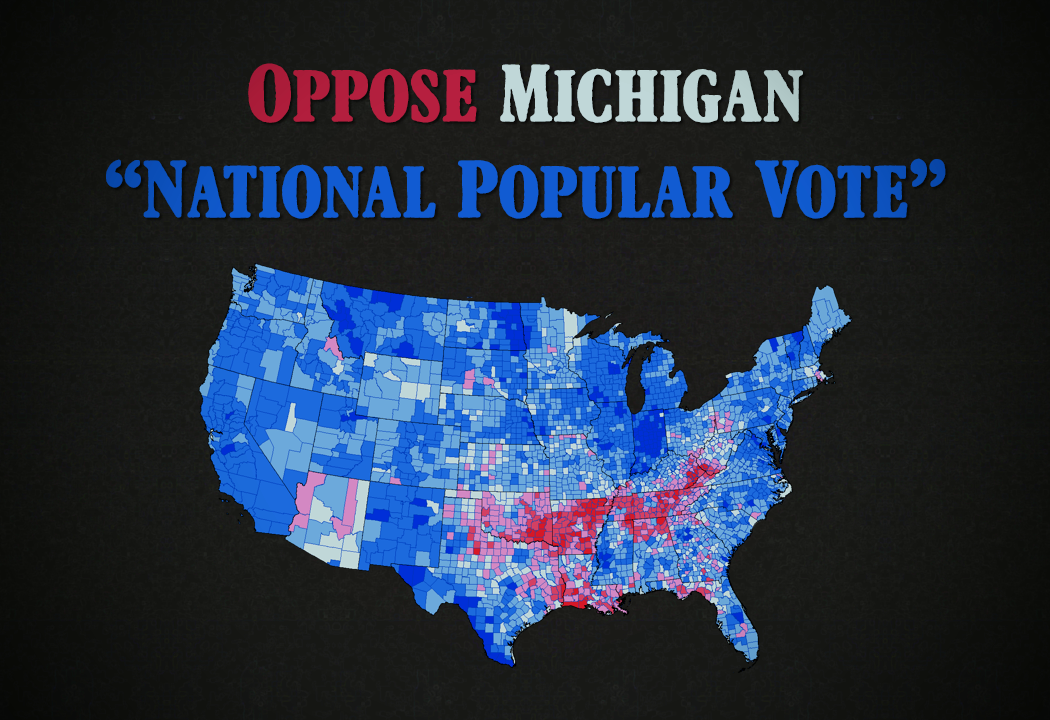Alert Summary
Members of the Michigan Legislature are seeking to pass legislation — including HB 4156 and SB 126 — implementing the “National Popular Vote” (NPV), an unconstitutional assault on our federalist and republican form of government.
Take Action NowContact your Representative
Please help stop the replacement of the Electoral College with the National Popular Vote by contacting your state legislators. Inform them of the Electoral College's importance and how it strengthens Michigan's influence over presidential elections. Also inform them of how our country was designed as a federal republic and not as a democracy or unitary state.
Clicking this button will take you to a page where you can send a pre-written letter, call your officials, and/or send video messages.

URGENT: NVPIC bill HB 4156, which passed out of committee, remains pending before the full House. It is imperative that these bills (HB 4156 and SB 126) fail in the Legislature. Contact your state representative and senator, and urge them to oppose these unconstitutional and subversive bills!
Members of the Michigan Legislature and other far-left activists are seeking to impose a subversive system that would award Michigan’s electoral votes to whichever candidate wins the “National Popular Vote.”
House Bill No. 4156 (HB 4156) and Senate Bill No. 126 (SB 126) have been introduced. If enacted, these bills would enter Michigan into the National Popular Vote Interstate Compact (NPVIC). Michigan is at serious risk of enacting this dangerous and subversive proposal.
This would not be the first time the NPVIC passed the Michigan House; it passed in 2008 by a 65-36 vote, with several Republicans voting in favor.
The NPVIC is an interstate agreement intended to subvert the Electoral College, which is established in Article II, Section 1, of the U.S. Constitution. Rather than awarding electors based on the winner of each individual state’s popular vote, the NPVIC seeks to award the electors of the states that belong to the compact to whichever candidate wins the national popular vote.
Under the agreement, the NPVIC would only go into effect when the total number of member states’ electoral votes reaches 270 — the minimum needed for an individual to be elected president. Currently, the NPVIC’s members account for 195 electoral votes, and Michigan’s potential entry would add another 15. This compact is dangerously close to becoming reality.
The NPVIC must be opposed as it is unconstitutional and an assault on the Electoral College and, more broadly, our federalist and republican form of government.
Implementation of the NPVIC would subvert both the Electoral College and our federalist system of government. Contrary to what many leftists and self-described “conservatives” claim, the U.S. is not a democracy, nor did the Founding Fathers want it to be so.
Counter-majoritarian institutions like the Electoral College, in addition to the U.S. Senate and Bill of Rights, illustrate this fact. They exist both to protect limited government and individual rights from the “tyranny of the majority” and also to preserve the sovereignty of both small and large states.
Abolishing the Electoral College is part of the push to turn the U.S. into a democracy and a unitary state — and, by extension, purge it of its national sovereignty, identity, and constitutionally protected liberties. By causing presidential elections to be decided based on the national popular vote without any regard for individual state preferences, the NPVIC would effectively accomplish all of the purposes listed in the previous sentence without actually amending the Constitution. This is why it is such a dangerous idea at odds with the Constitution and the Founders’ vision and underscores the need to oppose HB 4156 and SB 126.
Urge your state representative and senator to reject the unconstitutional and subversive NPVIC by opposing HB 4156 and SB 126.
Although we provide a way to easily email legislators, we know from long experience that it takes a lot more interaction with your legislators to get your point across than that provided by emails alone.
That's why we provide an easy way not only to email them, but to contact them by phone, tweet, and even video message them.
